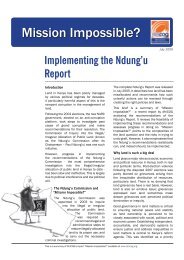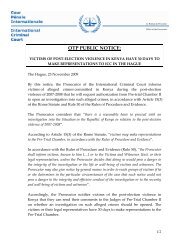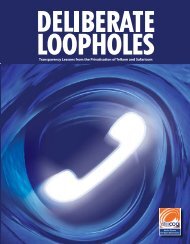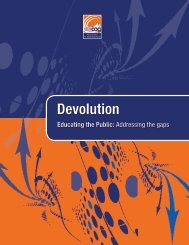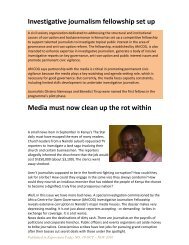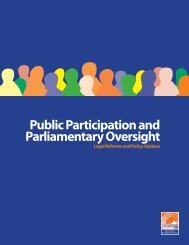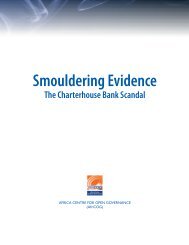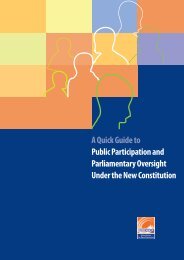Untitled - Africa Centre for Open Governance
Untitled - Africa Centre for Open Governance
Untitled - Africa Centre for Open Governance
You also want an ePaper? Increase the reach of your titles
YUMPU automatically turns print PDFs into web optimized ePapers that Google loves.
2. Key Re<strong>for</strong>ms Arising from the<br />
Implementation of the New<br />
Constitution in 2011<br />
The Kenyan Constitution of 2010 contains provisions that raise the bar considerably with specific<br />
reference to integrity and transparency. Chapter Six of the constitution provides guiding principles<br />
on leadership and requires persons that hold public office be selected on the basis of personal<br />
integrity, competence and suitability, or through election in free and fair elections. It also requires<br />
public officers to be objective and impartial in decision making and ensure that their decisions are<br />
not influenced by nepotism, favouritism, corruption or other improper motives. Leaders are also<br />
required to offer selfless service based solely on the public interest, to demonstrate honesty in the<br />
execution of public duties, to submit the declaration of any personal interest that may conflict<br />
with public duties and to be accountable to the public <strong>for</strong> decisions and actions.<br />
Chapter thirteen sets out the values and principles of public service to include high standards<br />
of professional ethics; efficient, effective and economic use of resources; responsive, prompt,<br />
effective, impartial and equitable provision of services; involvement of the people in the process<br />
of policy making, accountability <strong>for</strong> administrative acts; transparency and provision to the public<br />
of timely, accurate in<strong>for</strong>mation.<br />
The constitution further compels the government to be more transparent by providing citizens<br />
with greater access to in<strong>for</strong>mation. It provides that “every person has the right to freedom of<br />
expression, which includes freedom to seek, receive or impart in<strong>for</strong>mation or ideas.” 1 In addition,<br />
it provides every citizen with the right of access to in<strong>for</strong>mation held by the State; and in<strong>for</strong>mation<br />
held by another person and required <strong>for</strong> the exercise or protection of any right or fundamental<br />
freedom. 2 It compels the State to publish and publicize any important in<strong>for</strong>mation affecting the<br />
nation. These rights present potentially vital weaponry <strong>for</strong> the fight against corruption. Corruption<br />
thrives on secrecy as the persons responsible <strong>for</strong> perpetuating it are able to hide their corrupt<br />
actions and are there<strong>for</strong>e not held accountable <strong>for</strong> them. The right to access in<strong>for</strong>mation will<br />
ensure that the public is aware of the actions and decisions of their leadership. This knowledge<br />
<strong>for</strong>ms the basis upon which the public can hold their leaders accountable <strong>for</strong> their actions thereby<br />
strengthening the fight against corruption.<br />
To give effect to these and other provisions, the constitution compels Parliament to enact<br />
legislation within set timelines. Several of the laws which the constitution required to be enacted<br />
in the course of 2011 gave effect to Chapter 13 which relates to re<strong>for</strong>ms in the Judiciary, vetting of<br />
those seeking public office and the establishment of the Ethics and Anti-Corruption Commission<br />
(EACC). The year saw a record number of bills enacted into law including the Independent Offices<br />
(Appointment) Act, 2011; the Supreme Court Act, 2011; the Judicial Service Act, 2011; the Vetting<br />
of Judges and Magistrates Act, 2011 and the Ethics and Anti-Corruption Commission Act 2011.<br />
1 Article 33 (1) (a)<br />
2 Article 35 (1)<br />
2




